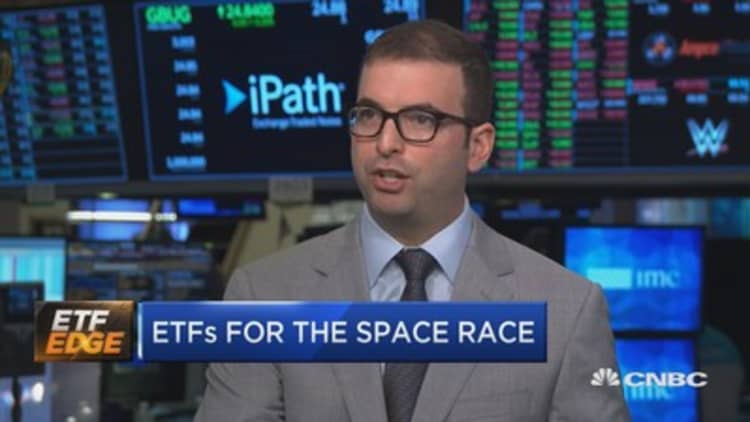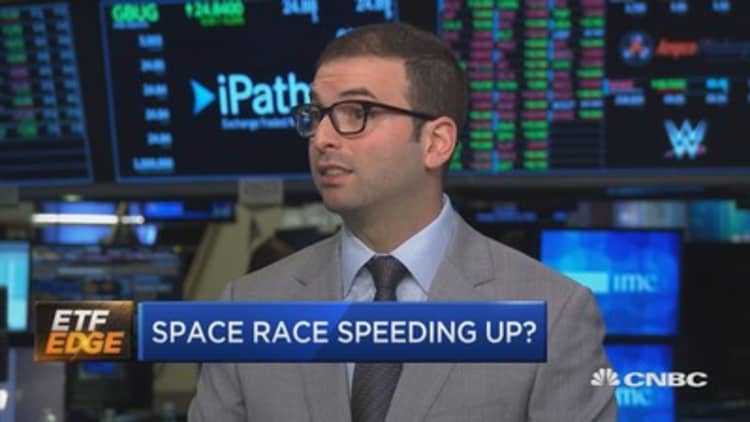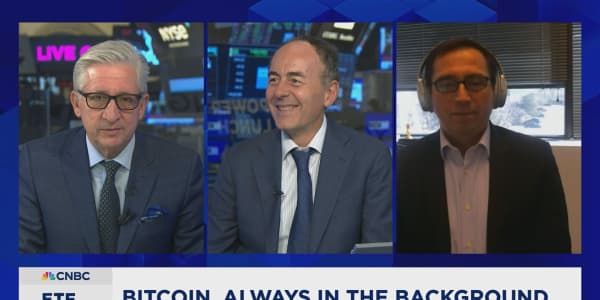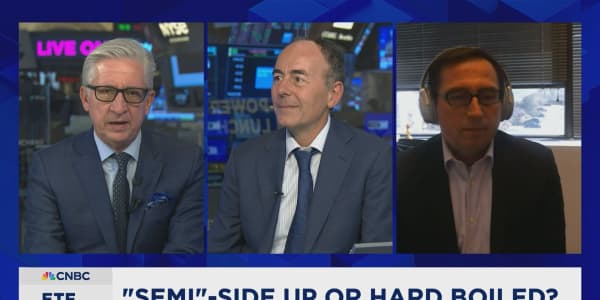
Space spending is speeding up.
World Space Week, a massive confab that takes place across over 80 countries, just ended, and it has breathed new life into organizations around the world participating in the space race, says one top industry player.
"People from all over the world are really realizing how important space is not just for any one individual, any one company or any one government. This is a truly global collaborative industry," Andrew Chanin, CEO of ProcureAM and the man behind the Procure Space ETF, ticker UFO, said Monday on CNBC's "ETF Edge."
This year, Chanin spotted a notable change in how institutions are approaching investing in space.
"What we're seeing is ... this transformation away from it being completely reliant upon government agencies like NASA, like Roscosmos, like the [European Space Agency], and it being driven by commercial interests now," the CEO said.
"So, the governments out there are saying, 'Hey, we want to play ball. We want to work with you. Come up with your solutions and we're happy to finance that.' But so much of the spending now is coming from outside the government, so it's a really exciting time for the industry," Chanin said.
Boeing's venture capital arm HorizonX announced in early October that it took a $20 million stake in Virgin Galactic, the space tourism company founded by Virgin Atlantic founder Sir Richard Branson. Elon Musk of Tesla fame recently said his space company, SpaceX, has spent "hundreds of millions of dollars" building a space capsule for NASA.
"I think one of the things that most people don't give the government or NASA enough credit with is how valuable $1 of spending from NASA is," Chanin said. NASA awarded SpaceX $2.6 billion to build the spacecraft model in 2014.
"It's come out in various reports showing that $1 that NASA spends actually shows $8-10 in growth," he said. "This money being spent by NASA isn't just for, 'OK, we want to be able to say we're great.' We're actually being able to take those technologies where that money's getting spent and turn that into a positive for the overall economy."
NASA spending has contributed to everyday life on this planet more than some may think. Satellites positioned above the earth are used for everything from GPS to weather forecasting to surveillance and intelligence services, Chanin said.
That's why his firm's UFO ETF is chock-full of satellite company stocks. Still relatively small vis-a-vis the rest of the ETF space with just over $12 million in assets, its top 10 holdings include communications satellite operators SES and Intelsat, GPS technology company Garmin and radio broadcasting giant Sirius XM. It's up 3.2% since its Apr. 11 launch.
But as spending on the space race gains momentum, UFO should, too, Chanin said.
"It really is a representation of the global, publicly traded space industry," he said. "This industry will likely change over the years. The index provider is aware of that, so they're already looking for companies that are going to be doing things in the militarization of space, in more space transportation and hospitality as well as infrastructure building."
And as NASA continues to support commercial interests in the space race, like its administrator's call on CNBC that SpaceX and Boeing could fly astronauts into space as soon as early 2020, it will expand the whole industry, Chanin said.
"We're seeing America's place in space starting to change," the CEO said. "We're also seeing tons of interest from around the world. China has aspirations, Russia has aspirations, India, Canada, and so on. So, the ideas, the technologies, where the winners are going to be? It's tough to say. But, certainly, having a contract from NASA saying, 'OK, we want to fund you to get to a certain point' is certainly helpful."
ETF industry experts like Chris Hempstead, a top consultant and Deutsche Bank's former head of ETF sales, said the inherent opportunity in this growing area of the market "struck" him when he was first helping Chanin launch UFO.
"What struck me as a consumer, as someone who's just learning about it for the first time, was that satellite story in and of itself," Hempstead said in the same "ETF Edge" interview.
"There's only a finite amount of satellite space above this planet, and so as these companies that you're looking at that are in this ETF vie for control of where to put those satellites not only amongst themselves in the U.S., but globally with other countries. It's a really interesting story about that, the cost of doing that and the value associated with having a satellite in orbit that can do some of the things that Andrew alluded to," he said.
UFO was down by less than 1% on Friday.






